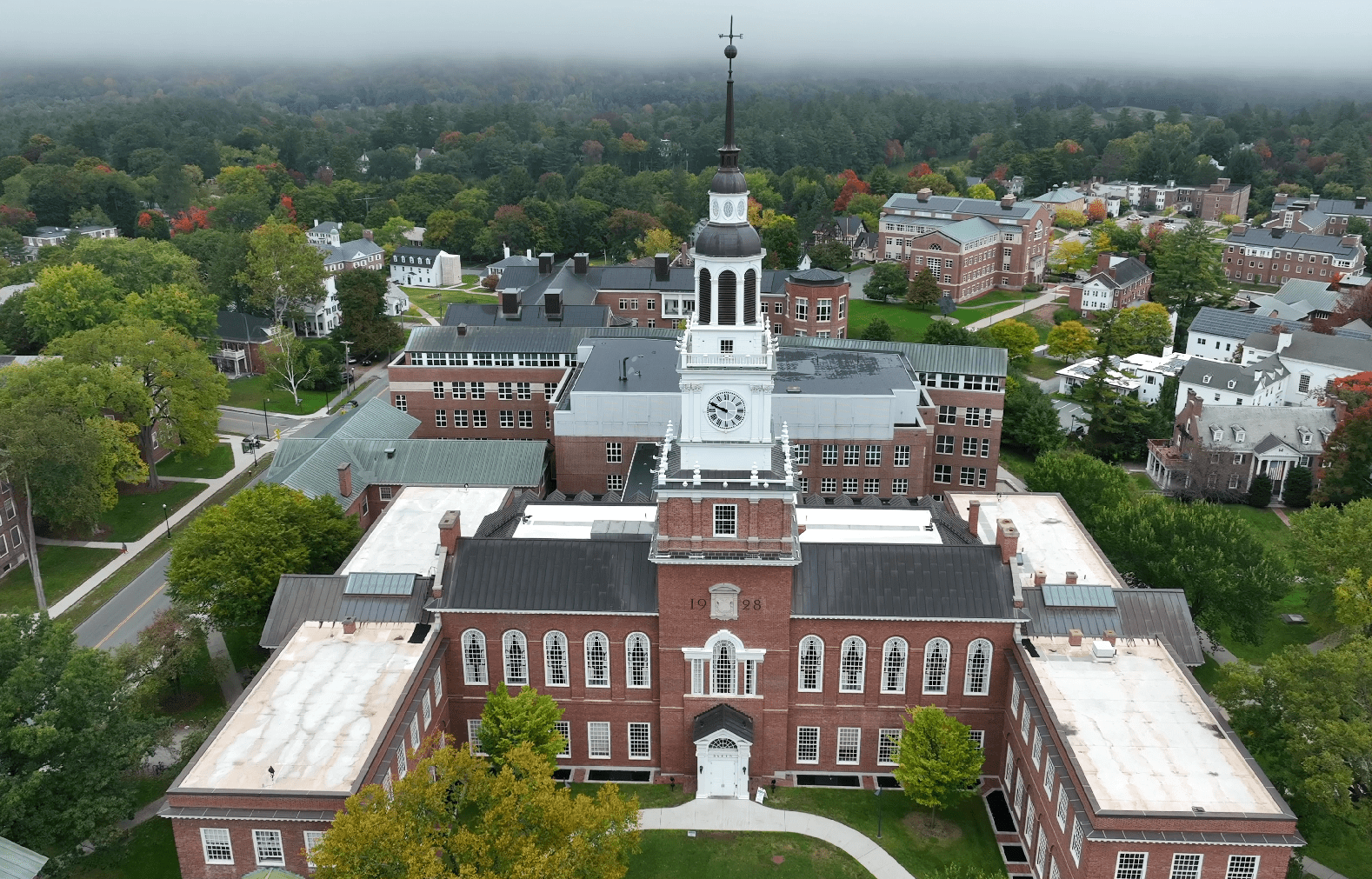Dartmouth College, the prestigious liberal arts university located in Hanover, New Hampshire, is a private, research university. First established on its rural campus in 1769, as a missionary school to educate Native Americans, it is a member of the Ivy League and ranked 12th in the USA. Dartmouth has a small undergraduate community of around 4,600 students, ten percent of whom are international. In addition, the Guarini School of Graduate and Advanced Studies has 2,100 postgraduates following Master’s and doctoral programs. Dartmouth inspires great loyalty and has the highest alumni participation rate in the world. As a result, it offers generous research funding to its students, and has a need-blind admissions policy. However, it is worth pointing out that the acceptance rate is a highly competitive six percent.
Study at Dartmouth College!
Get in touch with us for more information about studying abroad!
Table of contents
Dartmouth College: academic organization
Dartmouth offers a liberal arts curriculum and 60 majors, in the humanities, natural sciences, social sciences and engineering. The university’s focus is on undergraduate education, while its four professional and graduate schools run 19 arts and sciences postgraduate programs. These are divided into medicine, engineering, business and graduate and advanced studies. There are 39 academic departments and dual degrees are available.
Dartmouth undergraduates have to take 35 courses over four years, including a foreign language, writing class and 10 distributives – different subject areas which will give you a well-rounded, traditional liberal arts education. In addition, all undergraduates have to demonstrate that they can swim 46 meters and take three terms of PE. Each academic year is divided into four terms of ten weeks.


Dartmouth College: most popular and highly rated majors:
In terms of ranking, Dartmouth is ranked 6th in the USA for the quality of its teaching, and this is reflected in its national rankings for individual subjects:
- Anthropology and sociology -4th
- Global studies-4th
- Film and photography -5th
- Art-10th
- History-12th
- Performing Arts-14th
- Economics-15th
- Math-16th
- Chemistry-16th
The most popular majors at Dartmouth include economics, political science and government, and computer science. Dartmouth’s economics department is outstanding and its undergraduate program is ranked first in the world.
Dartmouth’s D-Plan: what is it and how does it work?
Dartmouth allows its students to shape their academic year by choosing whether to study off campus, do an internship or a research project , study abroad or attend classes on campus. In this way, each individual is able to decide when they wish to take classes, and when they want to go on break. Terms when you are not enrolled are called leave terms, and students can apply for funding for these periods. In Year 1, students have to be in residence for the autumn, winter and spring terms. In the second, sophomore year, students normally also attend summer term. Finally, in their senior years, students must be enrolled for three terms. This amazing flexibility enables students to do internships whenever they like, to pursue their studies through research fellowships and to create their own Dartmouth experience.
Dartmouth currently runs 40 off-campus language study abroad and foreign study programmes. Undergraduates who receive financial aid are also eligible for the same financial aid if they wish to study abroad.
Dartmouth College: life on campus
Dartmouth College is set among 269 acres of pine forest in the Upper Connecticut River Valley, and is often voted one of the most beautiful university campuses in the USA. Its Georgian colonial architecture and location, overlooking the Connecticut River, only add to the campus’ attractions. Hanover itself is a typical New England college town, with quaint shops, cafes and restaurants, museums and inns – and the start of the Appalachian Trail. The town comes into its own in the autumn when the leaves begin to fall, and skiers start to prepare their equipment for the first snow. Intercity buses can take you to Boston Logan airport, New York or Montreal, if you want a dose of urban life.
Dartmouth’s campus has eleven dining options, from restaurants to snack bars, and a flexible meal plan. Accommodation is organized around residence halls, affinity houses, society houses and fraternity and sorority houses. Over 90 per cent of students live on campus, and the dorms are given high marks when reviewed by students.
Dartmouth: campus induction
Dartmouth runs its famous DOC trips every September for the new intake of undergraduates. These student-run outdoor activities provide a taster of the Dartmouth community and give first year freshers a chance to bond and transition from home to university.
There are three types of DOC experience to choose from:
- Camping outside under tarpaulin. Activities include kayaking, paddleboarding, canoeing, fishing, hiking, climbing and timber sports.
- Cabin camping. You can choose to do meditation, yoga, photography, fly fishing, jamming, read nature literature or cook.
- Sleeping on campus. This option offers museum exploration, trips to get to know the Upper Valley and discover Dartmouth as a sacred space.
Dartmouth alumni invariably say that their DOC trip is their favourite memory of the university and one they still carry with them, years later.
Dartmouth College: traditions
Every February, the university organizes a three-day themed winter carnival to celebrate the season. Ice sculpture competitions, lifeboat races, snowshoe races, treasure hunts and polar bear swims are among the activities students can enjoy at carnival. Free ski lifts only add to the fun and sense of occasion. Once the snow has melted, Dartmouth runs a spring concert weekend, known as Green Key. Barbeques, free ice cream and food, parties, film screenings and cook-outs are the order of the day. Many Greek houses hold their own celebrations. These are always well-attended, since 43 per cent of men join fraternities at Dartmouth, and 47 per cent of women join sororities.
Dartmouth: homecoming and flair
Dartmouth’s Homecoming usually takes place in the autumn, around October. This celebration brings together current and former Dartmouth students, for all alumni are invited to attend. A giant bonfire and parade are at the heart of the event. First year students wait to be picked up from their dorm “spirit station” by the parade, which sweeps from one dorm to the next, until everyone is assembled.
Dartmouth expects every student to spend one “Sophomore Summer” on campus. Most students opt to do this at the end of their second year. The summer term involves taking classes in Hanover between June and August, in subjects such as acapella, comedy, ceramics and dance.
One well-known Dartmouth tradition is “flair”, namely the wearing of odd, flamboyant clothes in bright colours. Think men in pink tutus and steel-capped boots… In a similar nod to the bizarre, Dartmouth second year students traditionally floated down the Connecticut River using home-made rafts and rubber inner tubes in a summer event known as Tubestock. This was designed to be a sophomore bonding exercise but was banned by the town of Hanover in 2006. Undaunted, Dartmouth students organized an alternative, called Fieldstock. This includes music, racing around the campus Green in home-made chariots, tug of war and jelly eating competitions, as well as waterslides, barbecues and a dunking tank.
Dartmouth: sports activities
Dartmouth was originally created to educate Native Americans, and for many years its sports teams were known as the Indians. However, a growing hostility towards the caricature-like depiction of Native Americans, led to a change in the 1970s- and now Dartmouth teams are known as the Big Green. There are over 30 varsity teams on campus, but while sport is important, Dartmouth is not a sport-focussed university in the same way as Princeton, Harvard and UCLA. Nevertheless, the campus has modern, excellent sporting facilities, including:
- Berry Sports Centre
- Alumni Gymnasium
- Memorial Field stadium
- Rowing center
- Ice rink
- Softball field
- Track and field
- Dartmouth ski-way
There are numerous facilities and clubs at Dartmouth that offer students the chance to play a huge range of sports, including:
- Volleyball
- Equestrian
- Baseball
- Basketball
- Rowing
- Cycling
- Football
- Golf
- Ice Hockey
- Lacrosse
- Softball
- Squash
- Swimming
- Sailing
- Rugby
- Ultimate frisbee
Dartmouth: clubs and societies
Dartmouth College has over 350 societies and organisations running on campus and a lively Greek life. However, students are not permitted to join Greek societies until they are in their second year. In addition, the campus is home to the highly secretive Sphinx Society, founded in 1886, which is accessed by invitation-only and has its own headquarters, a tomb, on the grounds. Rumours about the Sphinx Society include the belief that they have a hidden swimming pool – since their water bill is so high – and that they take part in raids on Dartmouth property and steal artefacts. Another society, Casque and Gauntlet, traces its roots back to 1887 and is one of 14 recognised senior societies on campus, some of which are co-ed, others single sex.
Dartmouth College: the application process
Dartmouth accepts the Common App and also offers Early Decision (deadline 1 November, response by mid-December ) alongside Regular Decision (deadline 3 January, response by end of March).
As is normally the case, admissions are slightly higher during the Early Decision round, since students who accept a place have to sign a binding agreement to take it, and withdraw their applications to other universities. Therefore, Dartmouth does not have an Early Action option. It has been calculated that over 45 percent of each incoming class are admitted during the Early Decision round, with a low 4.7 per cent of students admitted through Regular Decision .
As well as filling in the Common App, you will be required to address the Dartmouth supplement’s essays. This is made up of three essays. The first essay is 100 words long, the others have a maximum word count of 250. The prompts and themes are fairly predictable and reflect Dartmouth’s emphasis on gaining a holistic picture of candidates. You may be asked:
- Who or what has shaped you?
- Why are you unique?
- What in your background will add value to the Dartmouth community?
- What makes you intellectually curious?
- What is your life’s purpose?
- How would you introduce yourself?
In addition, you will need to upload two letters of recommendation, transcripts of secondary school reports, a peer recommendation, proof of English language proficiency , with an IELTS score of 7 upwards and TOEFL of 100+. SAT and ACT are both optional and the fee for submitting your application is currently $80.You are allowed to upload a CV, relevant newspaper clippings or a portfolio in support of your application.
Dartmouth College: costs
Dartmouth College is an outstanding Ivy League university. Unsurprisingly, its costs are not cheap. Happily, Dartmouth not only follows a need-blind admissions procedure, but also guarantees to meet 100 per cent of the financial needs of eligible students who apply for financial aid. To give you an idea of what it costs to study at Dartmouth, here is a rough guide:
Tuition:$63,684
Housing: $11,400
Board: $7,500
Health insurance:$4,000
Provision of a computer: $1700
Travel and personal expenses:$8000
This gives us a total of $87,000 per year, minimum. Bear in mind that the estimates are based on a three-term academic year, and not four.
Dartmouth is a rich university and offers a range of scholarships, fellowships and grants for which international students can apply. Contact Elab if you would like to know more about the financial assistance available to you at Dartmouth. While international students have the right to work in the USA during their time at university, it is worth remembering that Dartmouth is a rural college and Hanover is not a large town. If you are hoping to supplement your income by working part-time, you would be well advised to look for jobs on campus, rather than within the local community.
Dartmouth College: recap
Dartmouth College is the alma mater of Nelson Rockefeller, Dr Seuss and Robert Frost, all of whom have made their very different marks on the world. Its academic credentials, brilliant professors, small community and world class resources attract students from all over the globe. If you would like to be one of their number, contact Elab and let us help and guide you to submit your application to prestigious Dartmouth College.




